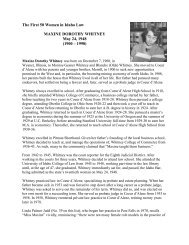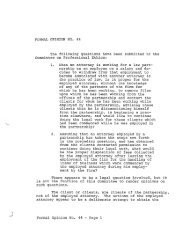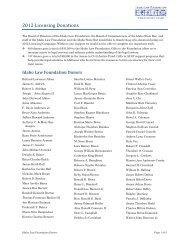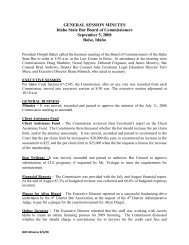The Advocate - May 2012 - Idaho State Bar - Idaho.gov
The Advocate - May 2012 - Idaho State Bar - Idaho.gov
The Advocate - May 2012 - Idaho State Bar - Idaho.gov
You also want an ePaper? Increase the reach of your titles
YUMPU automatically turns print PDFs into web optimized ePapers that Google loves.
maintained neighborhoods, and accompanying<br />
assessments. When these expectations<br />
are not met, potential liabilities<br />
arise for the associations. Out-of-state<br />
transplants and investors are bemused and<br />
puzzled when they find that the state law<br />
ground rules they expect to be in place<br />
simply do not exist in the “wild west” of<br />
<strong>Idaho</strong> HOA law. As a result, they are often<br />
willing to litigate. On the other hand,<br />
in a few cases a small clique of directors<br />
may selectively ignore <strong>Idaho</strong> corporate<br />
law and vague common law principles to<br />
go too far in the other direction, creating<br />
their own police state of assessments and<br />
fines with little accountability or control.<br />
Neither problem is easily challenged without<br />
resorting to the courts.<br />
<strong>Idaho</strong> could spell out much more<br />
clearly some general principles of fair<br />
play and transparency in all common interest<br />
property ownership regimes. For<br />
instance, most associations are currently<br />
non-profit corporations subject to the<br />
<strong>Idaho</strong> Nonprofit Corporation Act. 25 This<br />
is a start. However, the Act does not anticipate<br />
title-based assessments, requires<br />
consent for admission, and also allows a<br />
member to voluntarily leave the corporation.<br />
26 It is simply inapplicable in many<br />
ways to ownership-based membership.<br />
Solely clarifying situations when the Nonprofit<br />
Corporation Act does not apply to<br />
an HOA or condo association would be a<br />
worthwhile effort.<br />
Moreover, an HOA and a condominium,<br />
both based on real property ownership,<br />
with elected homeowner boards,<br />
fines, and common maintenance expenses,<br />
share much more in common than<br />
an association shares with other types<br />
of nonprofit corporations. Despite this,<br />
two neighboring associations may have<br />
completely different ground rules if one<br />
incorporated as a limited liability partnership,<br />
or failed to incorporate at all, and the<br />
other followed standard procedure to set<br />
up as a non-profit corporation. <strong>The</strong> federal<br />
mortgage financing regime has already<br />
imposed some standardization on <strong>Idaho</strong>’s<br />
condominium associations by tightening<br />
the requirements for condominium associations<br />
to receive approval for federallybacked<br />
loans. 27 However, this only adds<br />
to the unnecessary distinctions in <strong>Idaho</strong><br />
between the rules <strong>gov</strong>erning condominiums<br />
and those <strong>gov</strong>erning other forms of<br />
common interest property ownership.<br />
Certain basic “rules of the road” could<br />
easily be outlined in statute and provide<br />
basic guidance and assurances to all types<br />
of common-interest property owners, both<br />
condominiums and HOAs of all stripes.<br />
26 <strong>The</strong> <strong>Advocate</strong> • <strong>May</strong> <strong>2012</strong><br />
Out-of-state transplants and investors are<br />
bemused and puzzled when they find that<br />
the state law ground rules they expect to be<br />
in place simply do not exist in the “wild west”<br />
of <strong>Idaho</strong> HOA law.<br />
<strong>The</strong>re are still many important questions<br />
that have not been resolved by <strong>Idaho</strong>’s<br />
judiciary. For instance, <strong>Idaho</strong> courts<br />
have not yet defined the rights of minority<br />
property homeowners to not have the nature<br />
and character of their property rights<br />
fundamentally altered by amendments to<br />
a declaration of restrictive covenants. As<br />
mentioned earlier, <strong>Idaho</strong> courts have not<br />
spelled out the standards a declarationimposed<br />
dispute-resolution process or<br />
enforcement process must follow before<br />
an <strong>Idaho</strong> court will defer to it and require<br />
an owner to exhaust all association remedies<br />
before litigating. <strong>The</strong>re is no case<br />
law outlining transparency requirements<br />
for associations where association documents<br />
may differ from corporate documentation.<br />
This is by no means an area where<br />
other states have been shy to impose<br />
their own laws on local associations. Of<br />
<strong>Idaho</strong>’s six neighboring states, only Montana<br />
and Wyoming 28 lack comprehensive<br />
association legislation. Montana and<br />
Wyoming have bare-bones condominium<br />
legislation comparable to <strong>Idaho</strong>’s Condominium<br />
Property Act. 29 On the other hand,<br />
Washington 30 has a comprehensive battery<br />
of statutes addressing this topic. Oregon’s<br />
condominiums and associations are also<br />
heavily regulated, 31 as are Nevada’s. 32<br />
<strong>The</strong>re is no uniform data for accurately<br />
comparing the number of associations in<br />
each state, but it appears that the number<br />
of associations in <strong>Idaho</strong> is much closer 33 to<br />
the number in Utah 34 or Oregon 35 or even<br />
to Nevada 36 than to the handful that exist<br />
in lightly-regulated Montana and Wyoming.<br />
For this reason, the recent history<br />
of common interest property ownership<br />
legislation in Utah is instructive.<br />
Utah has had a condominium act in<br />
place since 1968. 37 In 2004, Utah also adopted<br />
a Community Association Act that<br />
addressed non-condominium HOAs. 38<br />
In recent years, a legislative action committee<br />
in Utah has attempted to introduce<br />
uniform common interest ownership laws<br />
that would unify condominium and hom-<br />
eowner association law. This has resulted<br />
in the adoption of a number of measures<br />
that greatly enhance Utah’s Community<br />
Association Act, although no uniform act<br />
has been adopted to date.<br />
During these same years, a number of<br />
bills have been introduced in the <strong>Idaho</strong><br />
legislature that are comparable to Utah’s<br />
early attempts at common interest property<br />
ownership law, or are at least a step in<br />
that direction. 39 However, there has been<br />
no central driving force to these efforts,<br />
and for the most part even minor bills<br />
have not passed. 40 According to parties<br />
involved in those efforts, there is a fundamental<br />
disagreement about whether <strong>Idaho</strong><br />
should quickly adopt small laws that address<br />
the largest common interest ownership<br />
problems, or whether <strong>Idaho</strong> should<br />
take advantage of its clean slate and adopt<br />
some version of a comprehensive law,<br />
modeled perhaps on the Uniform Common<br />
Interest Ownership Act (UCIOA). 41<br />
This disagreement is compounded by<br />
the usual conflicting interests of various<br />
stakeholders. Contractors, Realtors, associations<br />
and homeowners all have a valid<br />
interest in legislation of this type.<br />
In this lawyer’s opinion, if <strong>Idaho</strong> took<br />
a broad approach and adopted a version<br />
of UCIOA to fit <strong>Idaho</strong>’s needs, all stakeholders<br />
would have more room to negotiate<br />
and compromise. <strong>The</strong> stakeholders<br />
with organized lobbies could finalize rules<br />
they long have been pushing for, and lessorganized<br />
homeowners could be protected<br />
from injustice. Quick fixes have not met<br />
with success in <strong>Idaho</strong>. Furthermore, multiple<br />
rounds of short-term fixes may lead<br />
to further confusion, conflicting provisions,<br />
and ultimately more litigation. A<br />
bill can and should be crafted that helps<br />
all of <strong>Idaho</strong>’s stakeholders and sets clear<br />
and uniform guidelines for all common<br />
interest ownership associations. 42<br />
About the Author<br />
Jeremy O. Evans manages the Boise<br />
office of Vial Fotheringham, LLP, is a<br />
member of Community Associations In-









